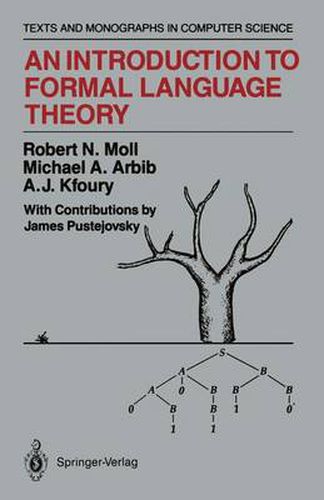Readings Newsletter
Become a Readings Member to make your shopping experience even easier.
Sign in or sign up for free!
You’re not far away from qualifying for FREE standard shipping within Australia
You’ve qualified for FREE standard shipping within Australia
The cart is loading…






This title is printed to order. This book may have been self-published. If so, we cannot guarantee the quality of the content. In the main most books will have gone through the editing process however some may not. We therefore suggest that you be aware of this before ordering this book. If in doubt check either the author or publisher’s details as we are unable to accept any returns unless they are faulty. Please contact us if you have any questions.
The study of formal languages and of related families of automata has long been at the core of theoretical computer science. Until recently, the main reasons for this centrality were connected with the specification and analy sis of programming languages, which led naturally to the following ques tions. How might a grammar be written for such a language? How could we check whether a text were or were not a well-formed program generated by that grammar? How could we parse a program to provide the structural analysis needed by a compiler? How could we check for ambiguity to en sure that a program has a unique analysis to be passed to the computer? This focus on programming languages has now been broadened by the in creasing concern of computer scientists with designing interfaces which allow humans to communicate with computers in a natural language, at least concerning problems in some well-delimited domain of discourse. The necessary work in computational linguistics draws on studies both within linguistics (the analysis of human languages) and within artificial intelligence. The present volume is the first textbook to combine the topics of formal language theory traditionally taught in the context of program ming languages with an introduction to issues in computational linguistics. It is one of a series, The AKM Series in Theoretical Computer Science, designed to make key mathematical developments in computer science readily accessible to undergraduate and beginning graduate students.
$9.00 standard shipping within Australia
FREE standard shipping within Australia for orders over $100.00
Express & International shipping calculated at checkout
This title is printed to order. This book may have been self-published. If so, we cannot guarantee the quality of the content. In the main most books will have gone through the editing process however some may not. We therefore suggest that you be aware of this before ordering this book. If in doubt check either the author or publisher’s details as we are unable to accept any returns unless they are faulty. Please contact us if you have any questions.
The study of formal languages and of related families of automata has long been at the core of theoretical computer science. Until recently, the main reasons for this centrality were connected with the specification and analy sis of programming languages, which led naturally to the following ques tions. How might a grammar be written for such a language? How could we check whether a text were or were not a well-formed program generated by that grammar? How could we parse a program to provide the structural analysis needed by a compiler? How could we check for ambiguity to en sure that a program has a unique analysis to be passed to the computer? This focus on programming languages has now been broadened by the in creasing concern of computer scientists with designing interfaces which allow humans to communicate with computers in a natural language, at least concerning problems in some well-delimited domain of discourse. The necessary work in computational linguistics draws on studies both within linguistics (the analysis of human languages) and within artificial intelligence. The present volume is the first textbook to combine the topics of formal language theory traditionally taught in the context of program ming languages with an introduction to issues in computational linguistics. It is one of a series, The AKM Series in Theoretical Computer Science, designed to make key mathematical developments in computer science readily accessible to undergraduate and beginning graduate students.